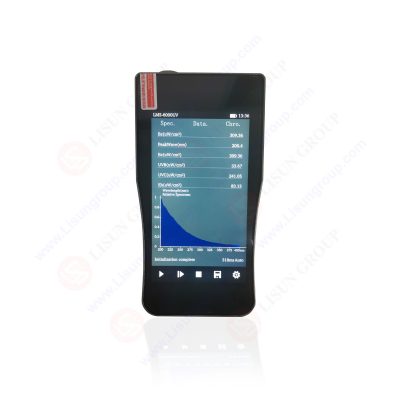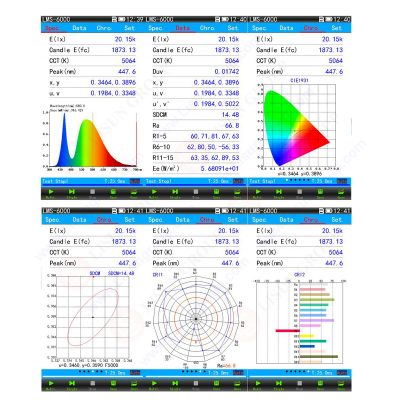LISUN is a leading manufacturer of spectroradiometers for remote sensing applications. These include geological and spectral remote sensing, crop and soil research, vegetative, forestry and canopy studies and more. Our spectroradiometers offer the finest mix of high resolution and sensitivity. This makes them the most precise field handheld devices available.
These devices can be used both in the field and in the lab. Our instruments are the most precise field handheld instruments on the market. They also have the best resolution and sensitivity results. This is primarily for remote sensing professionals. These instruments feature latest detection technology. They also have flawless optics and circuitry. They demonstrate the best in-field handheld spectroradiometers. Years of study and development have gone into creating these.
The full-range spectroradiometers from LISUN provide the quickest and most accurate spectral field measurements. They are better than any handheld spectroradiometer currently available. Testers benefit from ongoing upgrades to the device and other important components. Overall performance, signal, and integration times have all improved. We can see this when compared to previous generations. This article will tell why you should use a handheld spectroradiometer to test out your device.
A spectroradiometer, such as ones by LISUN, is a light measurement instrument. It can determine the wavelength and amplitude of light emitted by a light source. Spectrometers separate wavelengths based on where light strikes the detector array. This allows for a single collection of the entire spectrum. Most spectrometers have an uncalibrated base measurement of counts. This is influenced by the sensitivity of the detector to each wavelength.
This information is then used to calculate illuminance, radiance, luminance, flux and chromaticity. It is done using built-in or PC software and a variety of methods. Some more advanced spectrometer software packages are able to make baseline overlay comparisons, transmission and reflectance.
Spectrometers come in a variety of packages and sizes. They cover a wide spectrum of wavelengths. The spectrometer’s effective wavelength range is determined not only by the grating dispersion ability, but also by the sensitivity range of the detectors.
Research spectrometers frequently cover a wide spectral range from UV to NIR. They also require a computer to operate. Infrared spectrometers, on the other hand, necessitate more electricity to run a cooling system. Many Spectrometers can be adjusted for a single range. Then they are paired with a second system to allow for more exact measurements, a greater resolution, and the elimination of some of the more typical mistakes seen in broadband systems.
Handheld devices are also available in a wide range of spectral bands, from UV to NIR. They are available in a variety of container shapes and sizes. Common features of hand-held systems with integrated screens are built-in optics and an onboard computer with pre-programmed software. Mini spectrometers can be used on the go or in the lab because they are powered and controlled by a PC and require a USB cable. A fiber optic light guide is widely used to attach input optics. Micro Spectrometers, which are smaller than a quarter and may be integrated into a system or used independently, are also available.

Portable CCD uv Spectroradiometer
Handheld Spectroradiometer devices come in a variety of spectral bands. These vary from ultraviolet to near-infrared. They are also available in a variety of shapes and sizes. Built-in optics are common in hand-held systems with integrated screens. They also include a computer onboard with pre-installed software. Mini spectrometers can be used in the field or in the lab. This is because they are powered and controlled by a computer using a USB cable. To connect input optics, an optical fiber light guide is typically employed. Micro Spectrometers are extremely small instruments. They can either be employed on their own or as part of a larger system.
These devices fully meet international standards. Devices made by LISUN, are ISO and IEC certified and comply with CIE 177, CIE-13.3 , Optical-Engineering-49-3-033602, and IEEE.

A spectroradiometric system has the following are the essential components. It has an entry slit that governs how much light will enter the spectrometer. An input optics gathers electromagnetic radiation from the source. The resolution of a smaller slit will be higher but the total sensitivity will be lower. A collimator sends the light to the grating or prism. The grating or prism is for light dispersion. Optics are focused to align the light onto the Detector. A control and logging system to define and store data is also found.
Spectroradiometers are used in different applications and can be customized to satisfy a variety of requirements. A few examples are solar UV and UVB radiation, LED measuring, display measurement and calibration and remote detection of oil slicks.
Advanced light measuring parameters are easy to implement and collect photosynthetically active radiation. With the LISUN software interface, this is simple. Spectral irradiance, illuminance, and PAR are examples of these. Colorimetric testing is also possible with the equipment. We can also capture snapshots or continuous mode spectra. Our information can also be saved and exported. The whole spectral graph can also be saved. We list the parametes in an IRR text data file, snapshot, and PDF report.
These devices are based on one main principle. This is the measurement of the wavelength-optical radiation relationship. The direct result of spectroradiometer measurement is a curve made up of several isolated points. Each point’s x axis is the wavelength. The intensity at that wavelength is represented by the Y axis.
A spectroradiometer can measure wavelength range and ratio, noise equivalent power, and dynamic range as a result. It can also assess sensitivity and signal-to-noise ratio, as well as stability and stray light.

Portable CCD Spectroradiometer
Spectroradiometers have a number of advantages that come with their use. First, they offer menu-based software that is simple to use. They cater to practically all display measuring requirements. These devices can connect to almost any computer. Wireless and remote data transfer are also included. It’s also great for use in the field.
The Spectroradiometer looks at the challenges that researchers face. This challenges arise when they go out into the field and collect spectral observations. The device’s entire detecting capability allows for even data collecting. This is true for the entire spectrum of solar irradiation. Similarly, greater integration speeds enable more measurements to be taken within a limited solar gathering time window. The ability to collect data from a stationary base of operations is increased with a long-range wireless arrangement. Spectroradiometers with permanent fiber optic cable systems outperform those with detachable fiber optic cable systems. The device’s design reduces the risk of signal loss. This is due to the fact that it does not have a problem with broken optical fibers.

Spectroradiometer Application
Spectroradiometers produced by LISUN offer a range of features that make their devices the most precise field handheld devices available.
Lisun Instruments Limited was found by LISUN GROUP in 2003. LISUN quality system has been strictly certified by ISO9001:2015. As a CIE Membership, LISUN products are designed based on CIE, IEC and other international or national standards. All products passed CE certificate and authenticated by the third party lab.
Our main products are Goniophotometer, Integrating Sphere, Spectroradiometer, Surge Generator, ESD Simulator Guns, EMI Receiver, EMC Test Equipment, Electrical Safety Tester, Environmental Chamber, Temperature Chamber, Climate Chamber, Thermal Chamber, Salt Spray Test, Dust Test Chamber, Waterproof Test, RoHS Test (EDXRF), Glow Wire Test and Needle Flame Test.
Please feel free to contact us if you need any support.
Tech Dep: Service@Lisungroup.com, Cell/WhatsApp:+8615317907381
Sales Dep: Sales@Lisungroup.com, Cell/WhatsApp:+8618117273997
Your email address will not be published. Required fields are marked *